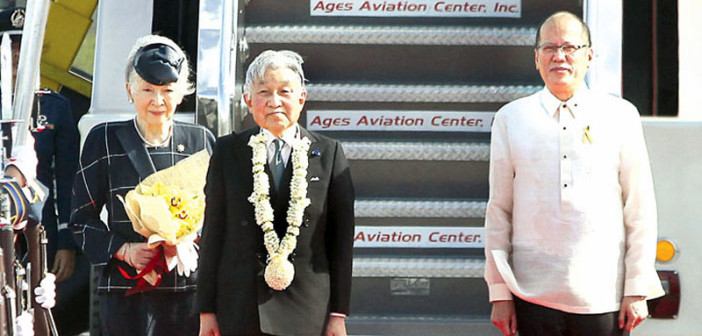Japan’s Emperor Akihito pledged to honor those who died in one of World War II’s deadliest battles, as he began a historic visit to the Philippines.
“In the Philippines, many lives of Filipinos, Americans and Japanese were lost during the war,” Akihito said at a ceremony at the Tokyo International Airport at Haneda before leaving Tokyo for Manila.
“History will always be in our hearts,” Akihito said.
Akihito specifically noted the battle for the liberation of Manila in 1945, where an estimated 100,000 people were killed.
“We’d like to conduct our visit by always keeping this in mind,” he said.
As soon as Akihito stepped out of the plane at the Ninoy Aquino International Airport, he offered a slight bow. He was then welcomed on the tarmac by President Aquino and many of his Cabinet secretaries. The President, wearing a barong Tagalog, was joined by his sister Pinky Abellada during the arrival honors for the Emperor and Empress of Japan at the airport.
After the airport ceremony, Their Majesties headed to Sofitel Philippine Plaza Manila where they will be billeted for the entire duration of their visit.
A group of 7-year-old all elementary students from the Manila Japanese School were also waiting at the hotel to welcome Their Majesties. The Imperial Couple approached the children to exchange greetings and converse with them.
Their Majesties also met with Japan Overseas Cooperation Volunteers (JOCV) in the Philippines who were waiting at the hotel for their arrival.
They later interacted with the 46 volunteers from various, discussing the Imperial Couple their experiences and problems in rendering services to different farming and fishing villages and other blighted areas in the country.
The Empress expressed her concern about one of volunteers who suffered dengue while serving a particular community.
At the seawalls of Sofitel, two chairs were prepared for Their Majesties for them to be able to watch the sunset comfortably. But they opted to stand, with the volunteers standing behind them, and admire the magnificent sunset.
“The Philippines is deeply honored to welcome their Imperial Majesties, the Emperor and Empress of Japan on the occasion of their state visit. Their visit underscores the abiding friendship between the Japanese and Filipino people,” Presidential Communications Operations Secretary Herminio Coloma Jr. said.
Coloma also cited Japan for supporting the peace process in Mindanao, extending relief aid to calamity victims, as well as providing aid in improving urban transportation in the country.
“On a personal note, the President recalls that when he accompanied his mother, the President Aquino, during her visit to Japan in 1986, Emperor Akihito’s father, the late Emperor Showa, even conversed with him and advised him to take care of his parents. He notes that Japan was one of the countries that provided robust support to the Philippines’ newly acclaimed democracy 30 years ago,” Coloma said.
The visit to the Philippines, the first for a Japanese emperor, coincides with the commemoration of the 60th anniversary of the establishment of diplomatic ties between the two nations.
Today, the President is expected to give a red-carpet welcome to the Japanese Emperor and Empress in Malacañang. A private meeting with the visiting royal couple will follow.
The President will also host a state banquet in honor of Japanese Emperor and Empress at the Palace later in the evening.
The Loboc Children’s Choir will punctuate the state banquet for Emperor Akihito and Empress Michiko with a Japanese children’s song “Hotarokoi” (fireflies).
“We have several songs in our official list, which we submitted to Malacañang for their approval. Almost 20 songs were presented, then five were chosen,” Alma Fernandez Taldo, Loboc Children’s Choir (LCC) founder and conductor, said in an interview.
The LCC, which will be among the performers during the dinner, will sing Light of a Million Mornings, Colors of the Wind, Nella Fantazia, Larong Pinoy and Hotarokoi.
“Hotarokoi is a very popular children’s song in Japan and we lovingly honor them (Emperor Akihito and Empress Michiko) by singing this song,” Taldo added. “The song is about fireflies, which has an important connection with the children,” she said, adding that the children imagine that they are fireflies, charming and enchanting the Japanese Emperor and Empress.
Toward the end of the 5-day trip, Akihito said he will be visiting the Japanese Memorial Garden in Caliraya, Laguna, to pay respects at the monument dedicated to the “souls of the Japanese war dead in many parts of the Philippines.”
“It is our sincere hope that this visit to the Philippines will contribute to the further development of mutual understanding and friendly relations between our two countries,” the Japanese Emperor said.
Aside from Caliraya, Their Majesties the Emperor and Empress are also scheduled to visit the Libingan ng mga Bayani in Taguig City, which was established as a resting place for Filipino military personnel as well as heroes and martyrs. Among those buried in the cemetery are most of the defenders of Bataan and Corregidor in 1942, and the battlefields of the Allied Liberation of the Philippines from 1942 to 1945 during World War II.
They will also visit a Japanese language training center and the International Rice Research Institute in Los Baños, Laguna.
Akihito noted that in 1962 he and the Empress visited the country as a representative of Emperor Showa, his father, to reciprocate the State Visit to Japan by then President Carlos P. Garcia.
“Today, after 54 years, we feel happy and moved to think that once again we have the opportunity to visit the Philippines on the occasion of the 60th anniversary of the normalization of diplomatic relations between our two countries,” the Emperor said in his remarks.




